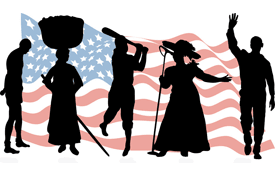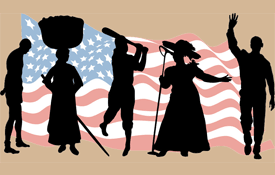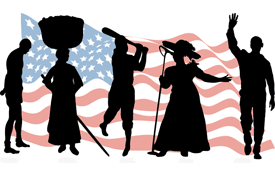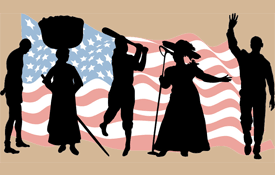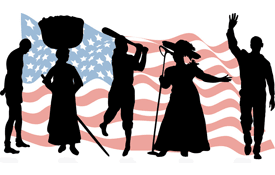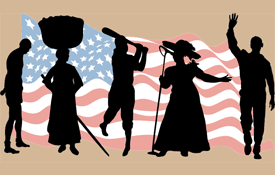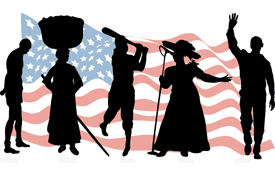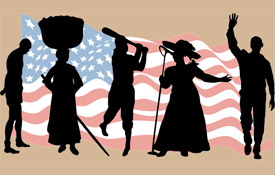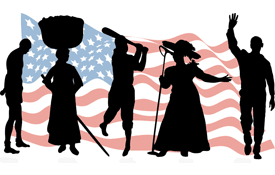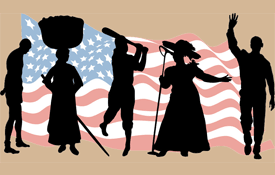Categories
-
0 Clifton R. Wharton Sr.'s Stamp of Approval
- History
- by Hugh Smith
- 05/31/2006
Among distinguished American diplomats, Clifton R. Wharton Sr. has just been honored by the United States Postal Service with a brand new stamp (May 30, 2006). Wharton was the first African American foreign Service Officer in the U.S. Department of State. He was appointed ambassador to Norway by President John Kennedy. Wharton rose through the ranks by accomplishment, not just by political appointment. He was the first black diplomat to lead an American delegation to a European country - Romania. His stamp honors nearly 40 years of public service. Appropriately, the Wharton stamp was unveiled in Washington D.C. at the world's largest free stamp expo, the 2006 World Philatelic Exhibition, (May 27 - June 3). It takes place only in the United States once a decade, and features the world's rarest stamps from 70 countries.
-
0 The U.S. Navy’s first Black Aviator: Jesse Brown
- History
- by Hugh Smith
- 05/26/2006
As we remember service men and women on Memorial Day, this quick spotlight features Ensign Jesse Brown, the U.S. Navy’s first black aviator. He received his wings in 1948. In December, 1950, his fighter was shot down over North Korea while flying a mission. Jesse was the first African American naval officer killed during the Korean War. The Navy awarded Brown the Flying Cross and Air Medal. In addition to his distinguished medals, a destroyer escort named the USS Jesse Brown was commissioned in 1973, a first for a African American naval officer.
-
- Dance
- by Hugh Smith
- 05/22/2006
Katherine Dunham, (1910 - 2006), the accomplished choreographer, dancer, teacher, humanitarian, anthropologist, civil rights activist, and black history pioneer, has passed away at 96. In the late 1930's, she established the USA's first self-supporting all-black modern dance company. The Joliet, Illinois native worked her way through the University of Chicago by giving dance lessons. She operated a clinic for disadvantaged children in Haiti, and at one time was the Director of Performing Arts at Southern Illinois University.
-
0 Black History High Fashion Threads
- Commentary
- by Hugh Smith
- 05/17/2006
Here are the thoughts of student Tevyn C., of Maybee, Michigan, USA, called "School Me." ---------- "I am an honor roll student who spends my spare time studying and teaching black history. It’s more than just a hobby, it’s my passion and calling. In social studies, we are taught that black people were slaves. I know African Americans were more than that, but I didn’t write the lesson plan. I wondered how I could get my peers to realize that much of what they use every day was invented by African Americans. It bothers me that my peers know every athlete and rapper’s name, but know little about our amazing achievements in science, math, and engineering. When I noticed that teens dress like rap artists, an idea came to me: I imagined a creative, hip way to teach others about African American ingenuity. I created an educational urban-style line of apparel named School Me: Clothing With A Little Knowledge. I embellish jeans and tees with embroidered pictures of familiar items like traffic lights, potato chips, blue mailboxes, super soakers, peanut-butter sandwiches, spark plugs, pencil sharpeners, etc. Kids read my shirt and say, “School Me?” Then I have the chance to give a quick educational lesson about these African American inventions. People of all ages are amazed by how much information can be learned from just a glance. Everybody pays attention to fashion and I’m the teacher! For three years I have been speaking at local events while sharing my ideas in mini fashion shows. My goal is to dress a celebrity. With the support of the hip hop community, I could reach millions of teens. When others recognize the contributions of African Americans, they will have a better appreciation for my culture. One day I would like to be able to say that I created a trend that diversifies peoples’ options." ---------- A great idea Tevyn. Congratulations for being a leader and taking action. You are moving the legacy of black history people forward. Good luck.
-
0 Floyd Patterson's Knock Out Punch
- Sports
- by Hugh Smith
- 05/11/2006
If you can't name the current heavyweight boxing champion, you are not alone. The golden era of Joe Louis, Muhammad Ali, George Forman, Sugar Ray Leonard, Joe Frazier, and Mike Tyson has long faded away. These greats were the center of their universe, the newsmakers of their time, the kings of the squared circle. Old school boxing legends were worshiped in the popular culture: stars of the tabloids, heroes on the front pages, sports gods on the back pages. Though the glory days of boxing are gone, there are many other champions who gave the fight game lots of personality. Floyd Patterson is one of them. Born in the Big Apple, young Floyd battled his way from the tough mean streets of Brooklyn, New York, to his ultimate destiny - the boxing hall of fame… 1952: Olympic middleweight champion 1956: heavyweight champion at age 21 – defeats Archie Moore 1959: loses the heavyweight title to Ingemar Johansson 1960: reclaims the heavyweight title – beats Johannsson Alzheimer’s disease and prostate cancer ended Floyd Patterson’s life at the age of 71 in May, 2006. He’ll always be remembered for his courage as a great champion, who survived a career that spanned great fame, and humbling misfortune.
-
0 Granville T. Woods Tightens up Technology
- Inventors
- by Hugh Smith
- 05/09/2006
On May 5, 2006, Inventor Granville T. Woods was inducted into the National Inventors Hall of Fame in Akron, Ohio. The Inventors Hall of Fame was established in 1973 by the National Council of Patent Law Associations, now the National Council of Intellectual Property Law Associations, and the Patent and Trademark Office of the U.S. Department of Commerce. Columbus, Ohio native Woods invented the railroad telegraph in the late 19th century, making it possible for moving trains to communicate with other trains and with stations. A genius with little formal education, and a machinist early in his career, Granville developed: telephone technology battery technology steam boiler technology 3rd rail technology (used by electric trains today) Why does it take so long for black history people to be formally recognized for incredible contributions? One reason, tied to discrimination, is because like Lewis H. Latimer and others, Woods was not able to benefit from his intellectual property. Granville Woods signed away most of his patent rights, so when he passed away in 1910, he had little money to show for his great inventions. Thank you National Inventors Hall of Fame, for inducting one of America's great inventors, Granville T. Woods.
-
0 Isaac Murphy - Kentucky Derby Legend
- Sports
- by Hugh Smith
- 05/05/2006
Saturday, May 6, is the first leg of horse racing's triple crown - The Kentucky Derby. The Derby, The Preakness, and the Belmont Stakes are the three biggest races of the year. A true pioneer, Isaac Murphy was the first jockey to win three Kentucky Derbies (1884, 1890, 1891). An African American with an outstanding horse racing record of 628 wins in 1412 races.
-
0 Azie Taylor Morton, Treasurer of the USA
- History
- by Hugh Smith
- 05/04/2006
A Washington D.C. teacher of women’s studies challenged us to obtain some "inside" information about Azie Taylor Morton, the first African American U.S. Treasurer, who is often overlooked among black history people. Here’s the scoop, direct from the public papers of President Jimmy Carter… In 1977, President Carter nominated Azie T. Morton, (1936 – 2003), of Annandale, Virginia, to be Treasurer of the United States. Ms. Morton was a staff assistant to the U.S. House District Committee. She was born February 1, 1936, in Dale, Texas, and received a B.S. from Huston-Tillotson College in 1956. From 1958 to 1961, Morton was an administrative assistant at the Texas State AFL-CIO, in Austin. She served as an administrative assistant and community relations specialist for the President's Committee on Equal Employment Opportunity and the President's Committee on Equal Opportunity in Housing from 1961 to 1966. From 1966 to 1968, Morton was a complaint investigator and conciliator for the U.S. Equal Employment Opportunity Commission. She was director of social services for the Wichita, Kansas, Model Cities Program from 1968 to 1971. Morton was special assistant to the Chairman of the Democratic National Committee from 1971 until 1977, when she went to work for the House District Committee. In 1974 she was vice chairperson of the Arrangement Committee and deputy conference manager for the 1974 Democratic Conference on Party Organization in Kansas City. She was a deputy convention manager for the 1976 Democratic National Convention. In 1975 and 1976, she served on the DNC's Compliance Review Commission. A great career of public service from a pioneer, Azie Taylor Morton.
-
0 The Charles H. Houston Institute for Race & Justice
- Civil Rights
- by Hugh Smith
- 05/02/2006
Dr. Charles Ogletree, of the Harvard Law School, was recently on the Michael Eric Dyson radio show, to talk about among many other things, his new book: "From Lynch Mobs to the Killing State: Race & The Death Penalty in America." What caught my ear during the interview was when Dr. Ogletree mentioned "his website," "CharlesHamiltonHouston.org." Knowing the background of the legendary Houston, It sounded unusual to my ear for Ogletree to reference Houston's name as his website. Charles H. Houston, (1895-1950), was a premier constitutional lawyer and civil rights pioneer. Under his watch as Dean of the Howard University Law School, many great lawyers were educated, including future Supreme Court Justice Thurgood Marshall. Houston won the famous 1935 Murray Case, a ruling that opened enrollment up to African American students at the University of Maryland Law School. The web presence of the Charles Hamilton Houston Institute for Race & Justice, founded in late 2005, is in a manner of speaking, Dr. Ogletree's website, honoring Houston for his outstanding Twentieth Century contributions. Professor Ogletree is the founding director, and Executive Director, of the Institute.
-
0 Marian Wright Edelman - Children's Champion
- Civil Rights
- by Hugh Smith
- 04/27/2006
Here's a quick review of an important woman who has dedicated her life to the cause of helping others... Social activist and Children's Defense Fund founder Marian Wright Edelman hails from Bennettsville, South Carolina. Despite the racial segregation and poverty of 1939 when she was born, her parents encouraged her as a young girl to overcome these odds. Marian attended Spelman College, the first college for black women in the USA. In the next phase of her life, she proudly served in the Atlanta, Georgia office of the NAACP, an assignment that inspired her to become an attorney. Edelman graduated from Yale Law School in 1963, and in 1965, she became the first African American woman to pass the bar in Mississippi. Marian also distinguished herself by serving as the Director of the Center for Law and Education at Harvard University. She began the non-profit Children's Defense Fund (CDF) in 1973. CDF is a strong contemporary national voice for children. The Children's Defense Fund secured the 1990 Act for Better Child Care, dedicating over $3 billion in funds for improving day-care facilities and other programs to help poor children. Marian Wright Edelman's awards include: The Albert Schweitzer Humanitarian Prize The Heinz Award The Ella J. Baker Prize The Presidential Medal of Freedom. She was also a MacArthur Foundation Prize Fellow, and has served on the Board of Trustees of Spelman College. Marian has written many articles and books, including "The Measure of Our Success: A Letter to My Children and Yours" (A number 1 New York Times best-seller).
